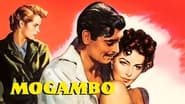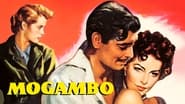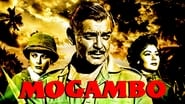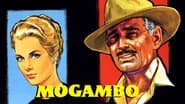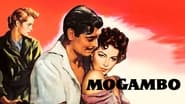Intcatinfo
A Masterpiece!
Comwayon
A Disappointing Continuation
StyleSk8r
At first rather annoying in its heavy emphasis on reenactments, this movie ultimately proves fascinating, simply because the complicated, highly dramatic tale it tells still almost defies belief.
Geraldine
The story, direction, characters, and writing/dialogue is akin to taking a tranquilizer shot to the neck, but everything else was so well done.
lasttimeisaw
By no means MOGAMBO is among John Ford's best work, nor is Gable or Kelly's, but, it brings Ava Gardner her the one and only Oscar nomination, this reason alone can suffice my curiosity and leapfrog onto the top tier of my watch list. Although the selling point is the African safari its exotic fauna, this film is a standard combo of location shooting and studio imitation, particularly feels ill at ease when the two drastically incompatible part bluntly encounter during the confrontation scenes in the gorilla field, one can feasibly detect actors are acting in front of the footages of the wild creatures, since the qualities of their cinematography are conspicuously inconsistent. We can never catch the vicariousness after all.The storyline is a meandering love triangle with a twist of adultery, Gable is Victor Marswell. a "supposed" charming, middle-aged bachelor and game hunter in Kenya, insouciantly circles around a freewheeling American widow Eloise (Gardner) and a young English wife Linda (Kelly), meanwhile, casually smuggles some wildlife from this primitive land. It is quite awful to watch now, not only because Gable has long passed his crest of his irresistible charisma, but his vocation is innately abhorrent, love is a too precious gift he should not deserve, not to mention from two diametrically disparate belles. Unfortunately this is the philosophy which the Golden Age of Hollywood spoon-fed to its audience (and the picture was a great box office success too). Gable is weathered but unerringly macho, stubbornly guarantees the aesthetics at then. Grace Kelly, soon would win her undeserved Oscar in THE COUNTRY GIRL (1954, 6/10) and reach the zenith of her short but sensational film career with Hitchcock's one-two punch REAR WINDOW (1954, 8/10) and DIAL M FOR MURDER (1954, 8/10) before retreating to be a princess, in here, she also got an Oscar nomination for BEST SUPPORTING ACTRESS, but her character is miserably off-putting, her unreasoning crush on Victor has never been effectively pulled off, although she does fully represent the usual feminine vulnerability to the hilt. Thankfully, Ava Garner is the saving grace in the movie, despite being equally badly materialized as a commodity to men's libido, she strives to be the woman who is decidedly intent on what she wants, most of time, she is stranded in her low tide during the tug-of-love, nevertheless she is perpetually exuberant and fully charged, the time when she feeds the baby elephant and rhinoceros with bananas is priceless, also when a leopard passes by in her tent at night, her response is simultaneously spontaneous and droll. Her presence can validly let viewers forget what a shoddy story it is as long as eventually she is the prize winner. I give the film a generous 6/10 in light of that, albeit all its drawbacks, at the very least it is a coherent star vehicle, and Ava Garner who should be tenderly remembered for her outright beauty and gallantry, even though her entire filmography is not that impressive, she is a one-of- the-kind screen diva who cannot be duplicated in this era.
Armand
after so many years, it seems be testimony about a gorgeous Hollywood age. in fact, it is a splendid film who use African landscapes as scene for a not bad story. sure, Gable is too old for his role and Grace Kelly too delicate, the story is not impeccable but Ava Gardner performance is really admirable. a smart film, like a duel between great actors and a decent script. atmosphere, animals, gallery of nuances explored with grace and talent, humor oasis and a subtle feeling about clash of cultures and ways to discover life. a romance but a special one. maybe for force of Gardner acting. or for the impeccable performance of Kelly but, in same measure, for the science of Gable to use the possibilities of his role.
moonbus-982-519398
Mogambo, 1953, is bound to be compared with Red Dust, 1932. The two films are based on the same stage play by Wilson Collison; the same man, John Lee Mahin, wrote both screenplays, some of the lines are even the same; the three main characters and the love triangle (or quadrangle) they form is the same; the leading man is played by the same actor, Clark Gable; and if you saw the first film, then you already know the "bang-up" ending.Many people will find the later film the weaker of the two, but I believe that if it is viewed for what it is, instead of for what it is not, it is not bad value for money. What made Red Dust a winner was Jean Harlow, her snappy witty lines, and the sweaty sensuality of the screen chemistry between her and Gable. That is what Mogambo is not; but it has a number of other things to offer instead. While most of the secondary characters in Red Dust, including the character of the adulterous wife (originally played by Mary Astor), are cast into the shadows by the sizzling repartee between Harlow and Gable, Mogambo allows the corresponding characters to develop and show some depth. In Mogambo, the motivations and inner conflicts of the adulterous wife (now played by Grace Kelly) are explored. The sappy jilted husband is given a great deal more depth in the later film than in the earlier one. And Gable's right-hand man, Brownie, is given a more substantial part as well. This makes the later film more rounded and the characters more believable, whereas the earlier film was basically a stage duel between the barbarian and the hooker. Red Dust has a sort of Who's-Afraid-of-Virginia-Woolf claustrophobia about it; it could have been entirely played out on a single indoor stage set. Mogambo features John Ford's typical outdoorsy-ness, some pretty spectacular wildlife photography (for 1950), and a rather tense confrontation with a tribe of angry, bare-breasted, spear-wielding natives (real Africans!). Not Ford's or Gable's best by any means, but a good solid show, worth 7 out of 10.Gable plays the same boorish, over-confident, God's-gift-to-women type in both films, but mellowed a bit (like wine, I mean). Whether you like that kind of man or not, you have to admit that he played it with grace and poise, and he showed that he could still do it 20 years on. The Gable character has been criticized by other reviewers for being incoherent or sappy. I disagree: he shows himself to be a man of raw courage, facing down wild animals, a savage tribe, a storm, etc., but finds he has lost his nerve when it comes to confronting the wimpy clueless husband. It takes Gardner to show him it wasn't cowardice, but that he did the decent thing after all.Grace Kelly takes over the role of the adulterous wife, a mere 27 years old (so we are told) and very naive; it takes Gable's experience, wisdom, and bluntness to make her see that she does not love her husband, whom she has known since she was five. Her performance has been criticized as confused and incoherent, and Gable too old to be attractive to her; but I can well believe that a sheltered girl who married her childhood-love would be pretty confused and dotty after the first 'real man' she had ever met had heroically saved her life twice in one week. Her distress and confusion are well played, and she screams well when confronted by a panther.Ava Gardner--well, what can one say that hasn't been already? The scene in which Gardner darts into the tribal missionary church and genuflects while the rest of the safari party go on about their business, gives her character an unexpected dimension the Harlow character lacked. I think it shows grand professionalism on Gable's part that he apparently quite happily let Gardner steal scene after scene. I guess Gable didn't have to prove anything to anyone anymore.
secondtake
Mogambo (1953)I can't look at a movie like this without asking who is in control, who is being abused, who is plundering, and why does the movie not talk about these discrepancies of power? African Queen, made just two years earlier, faces the same problem from a different direction, narrowing our view to the changing of two archetypes toward mutual understanding, largely avoiding the cultural problem. In Mogambo, the movie expands outward, with decreasing interest and believability. Yes, it has to be said, there are some stunning wildlife scenes, and some genuine (and valuable) indigenous singing and shots of tribal Africans on location. The film was largely shot in Africa, and it feels authentic in that way, a long way from earlier versions shot on a Hollywood lot.But Mogambo, a remake of the better "Red Dust," is a kind of embarrassingly bad movie in other ways. There's just no getting around the poorly developed characters, the almost non-existent "plot" (nothing much happens) and even the unconvincing romances, which should have won me over since I'm a sucker. John Ford is famously a masculine director, just as was John Huston ("African Queen"), and Ford became famous for making movies about the changing of one world order for another--the American Western. In a weird, simplistic way, this is another Western, with outsiders improbably facing strange territory and hostility, and with everyone misunderstanding at least something that leads them astray. The starring actor makes it worthwhile, for those of us who admire him, Clark Gable. Grace Kelly also appears, but as usual is largely ornamental and too ivory to advance the plot.Ava Gardner is whole other problem. She's full of life but has a miserable script to read from, and is made to be a caricature of a ditzy New York woman in wild Africa. Well, Ford "fleshes" her out in his own way, but Gable is more respectful, as usual. Either way, her performance ends up crippling some of the authenticity of the rest of it. She does have a fearless and quaint way with the animals (and the baby elephants in particular are super cute). In fact, if animal rights concern you, you might have trouble with all the trapped, hunted, and caged wildlife. Seen from 2010, this is a revealing and disturbing and frivolous, white colonialist's view of Africa. If you aren't distracted by the glib Gardner and the artificial Kelly, or by the attempts to be humorous, and to set the two woman against each other (one proper, in a dress, the other less so, in pants), you'll see some interesting footage. Intermittent footage is not my idea of a good movie.

